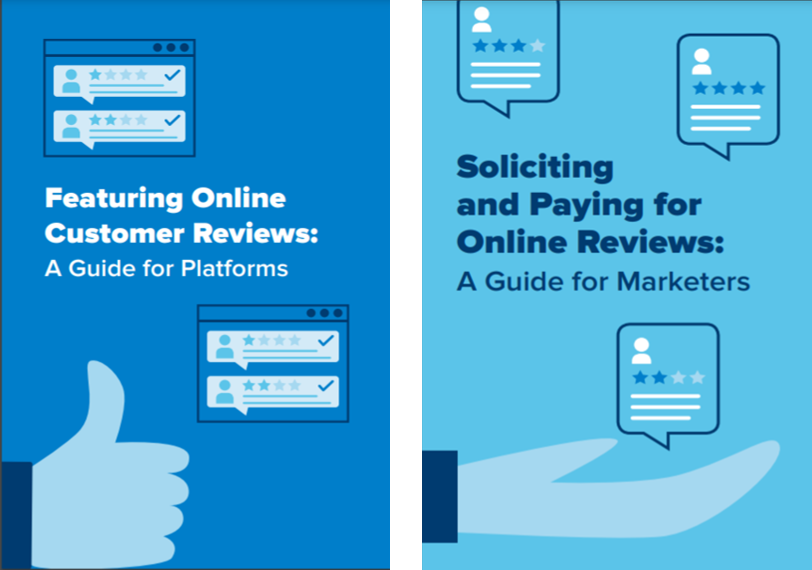Online customer reviews of products and services have become increasingly important in the marketplace. Many consumers rely on them to decide what to buy or where to buy it, and many companies rely on them to attract customers and stand out from the pack. That was true even before the pandemic hit, and it’s even more true now.
Consumers should be able to trust that these reviews reflect the honest opinions of actual customers. But some businesses abuse that trust by writing or procuring fake or deceptive reviews, including reviews that tout their own products or slam those of honest competitors. That kind of abuse harms consumers and, if unchecked, could also cause them to lose trust in reviews altogether, which would be bad for everyone. In addition, it distorts the marketplace by disadvantaging honest businesses who try to earn their stars the right way.
That’s why the FTC is issuing new guidance for businesses on online reviews. It’s important for everyone responsible for soliciting, collecting, and displaying reviews to do what they can to make sure that consumers don’t get misleading feedback about a company’s products and services. This will help companies stay on the right side of the law and build trust.
The FTC has been active for years in the review area, bringing a number of cases against people responsible both for fake and deceptive reviews and for suppressing honest reviews. The latest action is a just-announced settlement with online retailer Fashion Nova. We’ve also used our recently revitalized Penalty Offense Authority to issue a Notice Of Penalty Offenses to more than 700 businesses, putting them on notice about the consequences of misleading consumers with endorsements and reviews. Other regulators and international bodies have been active too, using their own expertise, experience, and unique tools. We’ve collaborated with them for years and applaud their efforts. For example, in the United Kingdom, the Competition and Markets Authority has been working to combat the illicit buying and selling of reviews.
 Today we’re also issuing two new publications with guidance for businesses about reviews, both drawing on principles from Section 5 of the FTC Act. One is for websites and platforms that collect, moderate, and publish reviews. The other is for marketers who may solicit or pay for reviews of their own products and services.
Today we’re also issuing two new publications with guidance for businesses about reviews, both drawing on principles from Section 5 of the FTC Act. One is for websites and platforms that collect, moderate, and publish reviews. The other is for marketers who may solicit or pay for reviews of their own products and services.
The guidance document for platforms advises that, no matter what the business model, they should, among other things:
- favor transparency about how they deal with reviews
- identify incentives and material connections between sellers and reviewers
- treat positive and negative reviews equally
- have reasonable processes in place to spot fake or deceptive reviews
- have effective reporting mechanisms for consumers and businesses to use
The guidance document for marketers is designed for companies that want to increase the number of reviews for their business on third-party websites and platforms. It focuses on how they solicit reviews from customers, use other companies that offer to boost their online reputation, and pay companies for supposedly expert reviews and rankings on comparison websites.
The FTC’s work on customer reviews is part of its broader effort to combat deception across the ever-changing landscape of online advertising, including the increasing use of social media influencers to sell products and services. We’re using and considering all the tools at our disposal – including law enforcement, rulemaking, collaboration with others, and education – in this effort. That multifaceted approach is reflected by the announcement of not only the Fashion Nova case and these educational pieces, but also letters to companies that may be engaged in a potentially deceptive practice known as “review-gating.” Stay tuned. You’ll hear more from the FTC on this topic.

It is your choice whether to submit a comment. If you do, you must create a user name, or we will not post your comment. The Federal Trade Commission Act authorizes this information collection for purposes of managing online comments. Comments and user names are part of the Federal Trade Commission’s (FTC) public records system, and user names also are part of the FTC’s computer user records system. We may routinely use these records as described in the FTC’s Privacy Act system notices. For more information on how the FTC handles information that we collect, please read our privacy policy.
The purpose of this blog and its comments section is to inform readers about Federal Trade Commission activity, and share information to help them avoid, report, and recover from fraud, scams, and bad business practices. Your thoughts, ideas, and concerns are welcome, and we encourage comments. But keep in mind, this is a moderated blog. We review all comments before they are posted, and we won’t post comments that don’t comply with our commenting policy. We expect commenters to treat each other and the blog writers with respect.
We don't edit comments to remove objectionable content, so please ensure that your comment contains none of the above. The comments posted on this blog become part of the public domain. To protect your privacy and the privacy of other people, please do not include personal information. Opinions in comments that appear in this blog belong to the individuals who expressed them. They do not belong to or represent views of the Federal Trade Commission.